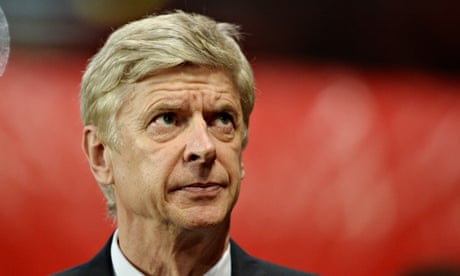The scale of Arsène Wenger's achievement when he reaches 1,000 matches as the manager of Arsenal next Saturday at Chelsea, having endured for almost 18 years at Highbury, places him among the greats. The obvious comparison, like Sir Alex Ferguson's with the former era-defining Manchester United manager Sir Matt Busby, is with Herbert Chapman, who championed Arsenal during a transformational time for the club and football itself.
Wenger has without question done something similar, becoming Arsenal's first manager from overseas when he took over from Bruce Rioch, who had done well at Bolton but was deemed inadequate for the Gunners' new Premier League and European future. Wenger pioneered and embodies not only the more cerebral football revolution that has taken place, the famous introduction of proper nutrition and the sparkling passing style that buried sneers of "boring Arsenal" but also the club's institutional change, from homely Highbury to the 60,000-seat stadium named after the United Arab Emirates' state airline.
Chapman, who lasted as manager only nine years, from 1925-34, before dying young, was a broader visionary, embracing modern fitness, professionalism and big-money signings for the team, as well as greater press projection and the brilliant coup of having the nearest tube station named Arsenal.
Wenger, also a towering figure in an era of great change, is more restricted in his influence. His professorial air, mastery of languages and economics degree can be a distraction when assessing him: Wenger has always been minutely obsessed with the football. There is a sense in which he has not embraced Arsenal's and football's epochal changes as Chapman did and that they have instead been hurdles, irritants to negotiate, and that the vast Emirates Stadium project was somehow built around him while he was frowning over formations.
Chapman, having astonishingly won two consecutive Football League championships at Huddersfield, won a third in 1926 and laid the foundations for Arsenal's dominance of the 1930s. Along with the upper-class chaps on the board chaired by Sir Samuel Hill-Wood, and the art deco extravagance and marble halls of Highbury constructed while northern football hotbeds were sinking into depression, "lucky Arsenal" were deeply resented by many as they lorded their five title wins.
With Wenger, by contrast, even while recognising his great abilities, achievements and longevity, his failure to win a trophy for nearly a decade has, inescapably, to be faced. He acknowledged it this week, before Sunday's derby at Tottenham Hotspur, the north London rivals whose absence from the Champions League and lack of a new stadium Arsenal can justifiably measure their huge progress against. Wenger laid the blame for Arsenal's lack of ultimate success on the comparative lack of money, the single most defining feature of his era, compared with that of the oil billionaire owners at Chelsea and Manchester City.
"I believe that when one day I look back, certainly I will be very proud of what I have done," Wenger said. "It was a trophyless period but certainly a much more difficult and sensitive period, and we needed much more commitment and strength than in the first part of my stay here. I went for a challenge that I knew would be difficult because we had to fight with clubs who lose £150m per year when we had to make £30m per year."
Wenger was discussing this second period, since the last trophy won, the FA Cup of 2005, and 2003, the year Arsenal's Invincibles – including Sol Campbell, Patrick Vieira, Dennis Bergkamp and Thierry Henry – won the double, including Wenger's third Premier League title, and so far, his last. In his lament he conflated two causes: the cost of building the Emirates Stadium and the arrival of the oil-rich Roman Abramovich at Chelsea and Sheikh Mansour bin Zayed Al Nahyan at City. They knocked Arsenal further back, bankrolling their own clubs with massive expenditure, which had not previously been a basis of the game's economics or culture, Jack Walker at Blackburn excepted.
Arsenal always solemnly declared they would not follow suit, that the directors, who mostly inherited their shares, chaired by Peter Hill-Wood, Sir Samuel's grandson, would not subsidise losses. The board coined the phrase "self-sustaining model" for this, and Wenger pledged to abide by it, always praising it as the responsible way to run a club. Now he identifies it as the reason Arsenal, seeking to break even or make a profit and with the stadium debt to repay, could not compete with Manchester United, Chelsea and City, who have won all the Premier League titles since 2005. "If I ask you tomorrow to race with Usain Bolt and win the race," Wenger mused this week as a comparison, "you will realise quickly it is difficult".
He has not always been as blunt about Arsenal's situation, often adopting the position of feeling rather above the grubby business of money. At the Arsenal annual general meeting of 2007, held in feverish mood after the recently ousted David Dein made £75m selling his shares to the Russian-Uzbek magnate Alisher Usmanov, the other long-term shareholders pledged not to sell, describing themselves as the club's custodians. The then managing director, Keith Edelman, who had steamrollered through the huge headache of the new stadium, said takeover talk had been "killed" and ran through the financial results. Income was hugely up, as planned, but £37m was paid in finance charges and players sold, including Ashley Cole to Chelsea. Henry had also gone that summer, to the resurgent Barcelona for £16m, and Vieira was sold to Juventus for £13.7m in July 2005. Edelman made the pitch that the Emirates was proving its worth in boosting income, with the famously expensive tickets and corporate feasting. Wenger, there to talk about the football and sprinkle the suits with stardust, took the microphone and joked: "Thanks about the money: it's very boring."
Now, looking back over the two distinct periods of his remarkable tenure, he blames the money for the lack of prizes. The custodians, meanwhile, did in fact sell, and make fortunes for themselves, selling in 2011 to Stan Kroenke, the American whose absentee ownership seems at odds with Arsenal's traditions. Wenger and the board reckon now that, having come through the most difficult years financially, and with Chelsea and City constrained by financial fair play rules, Arsenal have amassed a cash pile to buy top-rank players, exemplified by the £45m spent on Mesut Özil last summer.
"I accepted to stay here for a long time knowing that we had little chance to win the Premiership," Wenger said this week. "But I think now we are in position again where we can fight with other clubs to sign big players."
He failed crucially to sign a striker for this season, a deficiency likely to cost him another title. Arsenal are favourites for the FA Cup, though, and ending the trophy drought would be a breakthrough. Approaching 1,000 games in office, the French coach who pioneered Arsenal's modern era is looking ahead to many more and promising a third distinct period, in which he will spend the huge money he has always sniffed at and win again.

